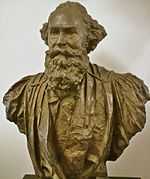LeConte Hall
|
LeConte Hall, University of California | |
 | |
|
West entrance | |
 | |
| Location | Berkeley, California |
|---|---|
| Coordinates | 37°52′21.42″N 122°15′22.55″W / 37.8726167°N 122.2562639°WCoordinates: 37°52′21.42″N 122°15′22.55″W / 37.8726167°N 122.2562639°W |
| Area | less than one acre |
| Built | 1924 |
| Architect | John Galen Howard |
| Governing body | Private |
| NRHP Reference # | 04000622[1] |
| Added to NRHP | July 6, 2004[1] |
LeConte Hall is a building on the campus of the University of California, Berkeley.[2] It is home to the physics department. LeConte Hall was one of the largest physics buildings in the world at the time it was opened in 1924,[3] and was also the site of the first atom collider, built by Ernest O. Lawrence in 1931.[2] The building was named in honor of the brothers Joseph and John LeConte, professors of Physics and Geology, who were respectively the first and third presidents of UC Berkeley.[4]
In 2004, LeConte Hall was named to the National Register of Historic Places.[1][5][6]
History
In 1924, the university opened LeConte Hall in order to accommodate an enlarged physics department, and to support the hiring of new, talented faculty. One of the newly hired faculty was Ernest Lawrence, who joined the department in 1928.[7] Lawrence, together with students M. S. Livingston and David Sloan built an 11-inch cyclotron and installed it in room 329 LeConte.[8] The device was the first successful, functional cyclotron[7] and produced a current of 1.22 MeV protons.
Lawrence set up the Radiation Laboratory ("Rad Lab") in the space between LeConte Hall and the Campanile. The lab was later moved up the hill and renamed Lawrence Berkeley Laboratory.[7]
Another nuclear physicist, J. Robert Oppenheimer joined the department in the summer of 1929. Oppenheimer maintained an office, together with his group of students in room 219 LeConte.[9] In 1942, Oppenheimer was appointed head of the fast neutron research group, and in the summer of that year, he invited the leading physicists of the time to discuss the theoretical aspects of developing an atomic weapon. The physicists and Oppenheimer's students, including Hans Bethe, John Van Vleck, Felix Bloch, and others, worked in the top floor of LeConte Hall and spent a month analyzing data.[10]

Nobel Prizes
In 1939, Ernest Lawrence was awarded the Nobel Prize in Physics, the first time the award went to a Bay Area resident.[7] Since then, LeConte Hall has been host to eight Physics Nobel Prize winning faculty and four alumni.[2]
Renovation
In 2006, the UC Berkeley campus completed a US$30.7 million renovation project, designed to update the LeConte Hall facilities as well as to provide seismic retrofitting.[11] Being a historic landmark, an effort was made to preserve the original architecture as well as to restore original attributes, such as the historic skylight on the fourth floor,[11] which houses the Berkeley Center for Theoretical Physics.
References
- ↑ 1.0 1.1 1.2 "National Register Information System". National Register of Historic Places. National Park Service. 2010-07-09.
- ↑ 2.0 2.1 2.2 "LeConte Hall". Interactive Campus Map. UC Regents. Retrieved 18 December 2011.
- ↑ "The First Cyclotrons". American Institute of Physics. Retrieved 18 December 2011.
- ↑ Leinhard, John. "Joseph and John LeConte". Engines of Ingenuity. University of Houston. Retrieved 18 December 2011.
- ↑ "LeConte Hall" (pdf). National Register of Historic Places - Registration Form. National Park Service. July 1985. Retrieved 22 May 2012.
- ↑ "LeConte Hall" (pdf). Photographs. National Park Service. Retrieved 22 May 2012.
- ↑ 7.0 7.1 7.2 7.3 Scaruffi, Piero (2010). A History of Silicon Valley. ISBN 978-0-9765531-8-2.
- ↑ Heilbron, J. L. "Lawrence and his laboratory". LBNL. Retrieved 19 December 2011.
- ↑ Pais, Abraham (2006). J. Robert Oppenheimer: a life. Oxford University Press. ISBN 0-19-516673-6.
- ↑ "Oppenheimer: A Life". Office for History of Science and Technology. Retrieved 19 December 2011.
- ↑ 11.0 11.1 "Le Conte Hall Major Renovation". Green Building research center, UC Berkeley. Retrieved 19 December 2011.
| ||||||||||||||
| |||||||||||||||||||||||||
| ||||||||||||||||||||
